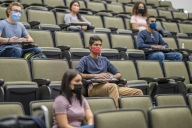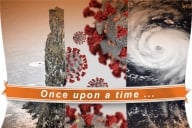You have /5 articles left.
Sign up for a free account or log in.
Doctoral alumni carry the distinction of spending more time at our institutions of higher education than any other student group. Yet this constituency can be misunderstood by those who manage institutional alumni engagement and development efforts. One prevailing myth suggests that graduate students have affinity only to their undergraduate institutions; another is that doctoral alums predominantly connect with their programs, rather than the institution, after graduation.
The twin pandemics of racism and COVID have recently shined a light upon the need for increased community building on our campuses. Complex issues have emerged, ranging from implementing institutional antiracist curricula and supporting international students to dealing with postgraduation job scarcity. Through collaborative efforts on our campuses, we can both better engage doctoral alumni and address a variety of such institutional challenges.
We approach this issue as three professionals from different institutions serving graduate students and alumni in some capacity. Two of us work in graduate schools, one as an assistant dean for career and professional development, and the other as director of external and alumni relations. One of us works in development as a director of planned giving. We met serendipitously, corresponding randomly after the publication of another Inside Higher Ed article about graduate students. As we shared our experiences earlier this past summer, we realized that many people who work in higher education, even those who interact regularly with graduate students, often don’t comprehend aspects of the doctoral journey. We also realized that we have a responsibility to advocate for all graduate alumni in campus conversations.
Without a connection to the distinct educational undertaking of the doctorate -- a path that most people will never experience -- people may struggle to grasp the agony and ecstasy of graduate education and the challenges doctoral students face on their journey to the degree. Those students undergo countless rites of passage, from the make-or-break relationship with an adviser and submitting the dissertation proposal to the arduous writing process. And minoritized individuals or people of color confront a myriad of additional challenges.
As we experienced upheaval in the world both inside and beyond our campuses, the conversations among the three of us throughout the spring and summer months evolved from “How can we create more connections with doctoral alumni?” to “How can we inspire more of our campus colleagues to do the same?”
First, we acknowledged that the doctoral community is a discrete slice of the broader alumni ecosystem, with needs that only those possessing some interest in the doctoral journey can understand. For example, we’ve seen doctoral alumni readily assist current students through gifts that fund broad-impact programming and support systems these alumni didn’t have (but wish they had) when they were students.
If we are to offer diverse transformative and value-added engagement opportunities for doctoral alumni, we have found that it helps to work together. Collaboration is key to successful relationships. A development or alumni engagement officer, for example, might consider consulting with their graduate school and other student services/student affairs units on developing broad-impact initiatives on their campus.
Together, they could also develop a balanced model for engaging doctoral alumni, both in terms of relationship building and philanthropy, using both qualitative and quantitative data from campus stakeholders and alumni. Generally speaking, the doctoral alumni we have worked with tend to shy away from traditional large alumni gatherings and social networks without a professional or career-development benefit. They appear to seek quality long-term relationships. Maybe that’s because the doctoral education process is such an individual journey with often an intimate support system. This is why it makes sense for alumni engagement officers to work closely with a graduate careers office.
Many colleges and universities already have existing relationships among offices and staff focused on alumni relations, doctoral and postdoctoral career planning, and development. There may be dedicated alumni engagement or development staff embedded in graduate programs or robust collaborations that encourage connections between doctoral students and alumni. Such individuals know how to find and leverage alumni for programming and resources -- even if those are not always tailored for doctoral alums.
For other institutions, however, organizational and reporting structures make leveraging the resource of graduate alumni challenging. Alumni relations, development and doctoral/postdoctoral career development can be dispersed throughout a campus, centralized or co-located but may not be formally coordinated. In many cases, staff members from across these areas may not ever interact or collaborate. There are lots of campus offices that are not traditionally present in the doctoral alumni engagement space, but we feel they could be.
Listening and Responding in New Ways
Raslyn Rendon, now director of graduate alumni relations and events in the graduate division of the University of California, Irvine, is a 12-year veteran of graduate affairs. Since assuming her role six years ago, she has worked diligently to engage the university’s graduate alumni and can attest to the different needs of this community. Rendon has found that having access to both lenses -- graduate affairs and alumni engagement -- has been essential in building the right programming for doctoral alumni.
“If you create a space for honest input and feedback with graduate alumni, they have no problem telling you that they do not connect with the traditionally offered engagement opportunities,” she told us. “As they did as students, they are making very active and calculated choices about where and how they spend each hour of their time. If it’s not a value-added effort that speaks to them as more advanced, and often quite cerebral, professionals, then we’re probably not going to win them over. But make no mistake, they want to engage and be engaged by their graduate alma mater. They often have an innate desire to help the next generation of scholars because they are deeply aware of the value they reaped from those who helped guide them. They just want to do it in a way that fits their needs and professional goals.”
Graduate affairs professionals like Rendon have a sense of who graduate alumni were as students and understand their academic and career trajectories. They are able to help alumni engagement and development colleagues understand the doctoral community. They are also quick to create synergy among campus offices because graduate affairs work values collaboration.
No matter your path to graduate alumni engagement, there are many options to team up with others who might share your goals. You could connect over a need to grow the alumni association, to increase stewardship of graduate fellowship donors or to improve alumni data by working with those who assess doctoral programs. Other campus partners might be interested in recruiting mentors and volunteers, growing a diverse leadership, interacting with athletics or veterans' affairs, or supporting the career needs of current doctoral students and postdocs.
Partnering with graduate student organizations is another great opportunity to connect alumni to current students. Northwestern University’s Jaclyn Hugg did this when she and others established the Ph.D. Pathways virtual mentor circle series in 2020. This program offers graduate students the opportunity to engage in meaningful dialogue with Ph.D. alumni around diverse career trajectories. Hugg, associate director of alumni engagement for the Northwestern Alumni Association and the Graduate School, collaborates with a number of colleagues across campus, including the student-run McCormick Graduate Leadership Council. There have also been partnerships with the university’s career advancement professionals and the Office of Fellowships.
“A key to the success of Ph.D. Pathways has been the relationships we have built with graduate student organizations. Through early conversations with representatives of the leadership council, we quickly realized that they had a strong pulse on the career exploration and mentorship needs of graduate students,” Hugg observed. “As we look to continue the series this academic year, it is exciting to be able to expand our network of graduate student organizations. Particularly, I am most looking forward to working with the Black Graduate Student Association to offer focused support and mentorship to Black graduate students. Whereas our primary objective is to connect graduate students with Ph.D. alumni for career development purposes, another aim is that we intentionally design these experiences to be both accessible and inclusive as the program grows.”
Alumni career programs like the one at Northwestern exist in countless other institutions, and the move to virtual programming has opened up possibilities for even greater student/alumni engagement not limited by geography or travel budgets. The University of Maryland Graduate School’s Rita B. Leahy Doctoral Career Series, for example, has been offering monthly presentations by diverse alumni since 2018. Most recently, they sponsored the first-ever regional doctoral alumni gathering focused on nonacademic career support for current students and postdocs. The six health science institutions in the University of Texas system recently collaborated on a Career Exploration Network program matching graduate students and alumni from across the country for structured virtual networking conversations.
Doctoral alumni jump at the chance to share their career journeys and readily mentor current doctoral students and postdocs. Their advice and guidance are often not just about a student’s exit strategy or career transition planning but also provide valuable insight during all stages of doctoral education.
Leopoldo Torres Jr., a recent University of Maryland alumnus and current postdoctoral scientist at the American Dental Association, benefited from this type of mentoring and has already started giving back. “Whenever I needed guidance, personally or professionally, alumni mentors were always there for me,” he said. “Considering how much time doctoral alumni once spent at an institution (five-plus years) and, in many cases, as educators, they deeply understand the intricacies of campus life and can help students with the many facets of their educational and professional journey. I personally try to serve in a mentorship capacity for students at all levels at my doctoral institution.”
In many universities, the stories of active doctoral alumni like Torres remain largely untold -- or heard by only a few. It’s not surprising that many doctoral alumni feel a lack of connection to our campuses. It is important to work with our communications and marketing colleagues to broadcast such examples of service and philanthropy.
And while we hope our graduates go on to do great things in their careers, we also hope they are kind, empathetic, generous and inclusive in whatever they do next. As institutions, we have a responsibility to provide exposure to doctoral alumni role models and to also provide access to learn from them. What better way than a feature story, a podcast or a virtual event?
Racism and COVID have forced many institutions to look deeply at the entire graduate student experience -- and the many issues that have always been there but never elevated to current prominence. From mental health and equity to challenges faced by graduate students with families and the international community, greater anxiety now surrounds graduation, job opportunities, access and financial stability. What gives us hope is how institutional leadership is listening and responding in unprecedented ways. As the three of us shared the experiences of working on our very different campuses, we realized that doctoral alumni are an important missing piece in this time of crisis. They have always been there, but perhaps hidden in plain sight.








